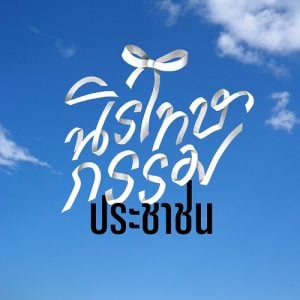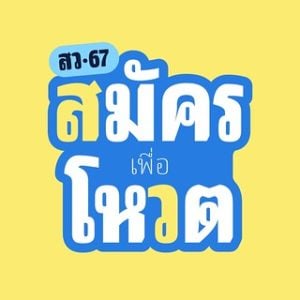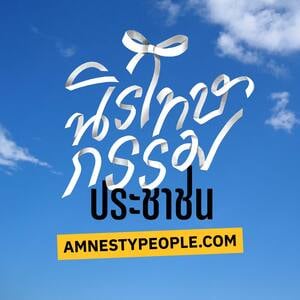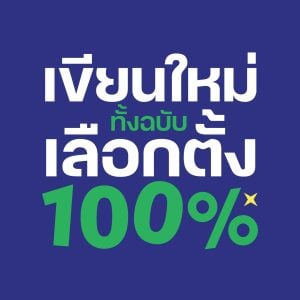The United Front for Democracy against Dictatorship (UDD) or ‘Red-Shirts’ protests in 2010 and the subsequent military crackdown had resulted in property damages, injuries, and death of not only protestors and authorities, but also innocent individuals. Ten years have passed, but the truth has not been mentioned and systematically handled by the government.
One consequence of the political conflict in that period, which had begun since the 2006 coup, was a marked increase accusations against the Red-shirts protesters on the ground of defaming a member of the royal family under the Lèse Majesté law according to section 112 of the criminal code. This led to a large number of arrests and prosecutions between 2010-2012, creating an atmosphere of fear. Many has then advocated for the amendment or repeal of the Lèse Majesté law, but success still seems far away. Meanwhile, the “silence” created by the “section 112” has asserted influence many years afterward.
Marking the 10th anniversary of the 2010 protest crackdown, iLaw would like to invite readers to revisit examples of section 112 cases which relate to political expressions during and those in connection with public demonstrations. These include prosecution of speakers at protests, protest participants, magazine producers, website designers, and even senders of mobile text messages.
“Uncle SMS”
Allegations: Sent 4 Text messages to the Secretariat of the Prime Minister between 9-20 May 2010 while the military crackdown was underway.
Sentence: 20 years in prison
Status of the Accused: Dead in prison on 8 May 2012
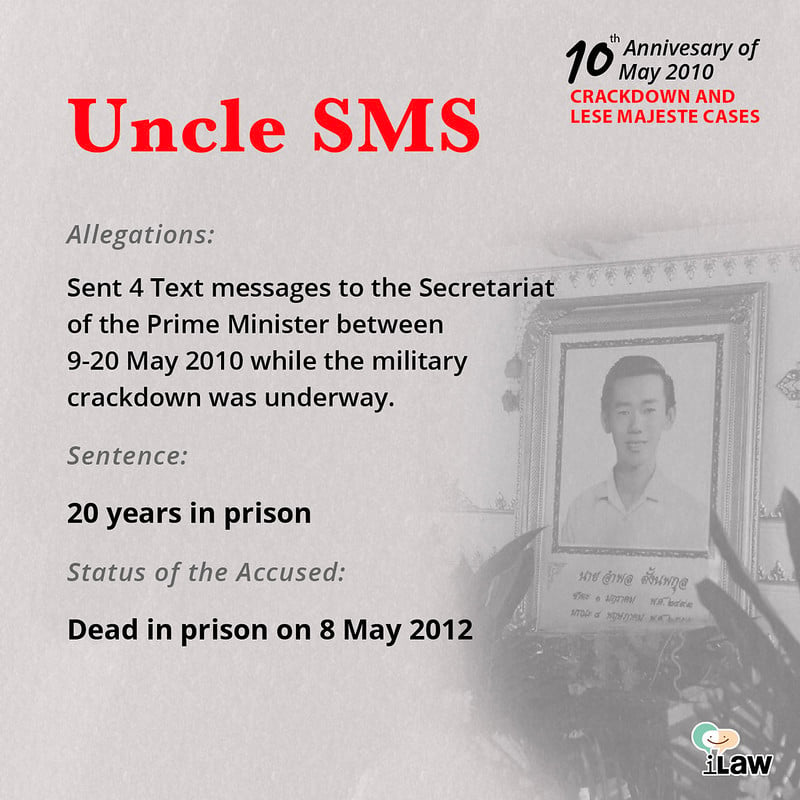
Ampon, also known as “Arkong” (Thai-Chinese term for Grandfather), was arrested at the age of 61 when police rushed in to his residence on 3 August 2010. He was accused for sending text messages to Somkiat Krongwatanasuk, then secretary of Prime Minister Abhisit Vejjajiva; all four texts appeared to profane and threaten his majesty the King and her majesty the Queen. The high rate of sentence in this case drew a lot of attention; the defendant, Arkong, is a destitute elderly who consistently rejected all charges, claiming he neither knew how to send text messages, follow politics, nor side with any political ideology. Additionally, the examination of electronic evidence that was based largely on the International Mobile Equipment Identity number (IMEI) was problematic.
Ampon was arrested and denied bail, causing him to end up in prison for 63 days. The Court of Appeals allowed short-term bail until the public prosecutor submitted a prosecution order. Consequently, Ampon was held in jail for the duration of the criminal proceedings.
Ampon testified to the court that he was a truck driver but had retried from the job for more than ten years and had been living with his wife and grandchildren in a small rental apartment. He claimed that he did not send the text messages and had no knowledge of Somkiat Krongwatanasuk’s telephone number. Regarding the use of the telephone, Ampon said that he did not keep the telephone to himself at all times; he only occasionally brought the phone along when picking up his grandchildren. While at home, Ampon would leave his telephone somewhere at home where there were some visitors.
Ampon testified that was saddened when he learned of the charges brought against him; with tears flowing, he said he loved the king and was loyal to the monarchy.
Ampon’s lawyer tried to defend the prosecution’s argument based on IMEI number that it could not be coherently connected with the criminal act the defendant was accused of because the IMEI number could be falsified and replicated. The prosecution did not have an eyewitness or text evidence to pinpoint the defendant as the one who typed and sent the text messages.
On 23 November 2011, the Civil Court found Ampon guilty and sentenced him to 20 years in prison according to section 112 of the criminal code and the Computer Crime Act. He later asked for bail in order to obtain the appeal right but was rejected. Ampon withdrew his appeal request and submitted a petition for a royal pardon. However, on 8 May 2012, he died while in custody at Bangkok Remand Prison. According to court investigation, the causes of his death were circulatory and respiratory failure resulting from the last stage of liver cancer.
For further details: https://freedom.ilaw.or.th/en/case/21 Additional story on this case: https://blogazine.pub/blogs/groomgrim/post/3310 |
Thantawut a.k.a. “Noom Rednont”
Allegations: Administering a website called ‘norporchorusa’ where information regarding the United front for Democracy against Dictatorship (UDD) protests were posted in March 2010
Sentence: 13 years in prison
Status of the Accused: Release by Royal Pardon then leave the country after had been summon by NCPO after 2014 Coup
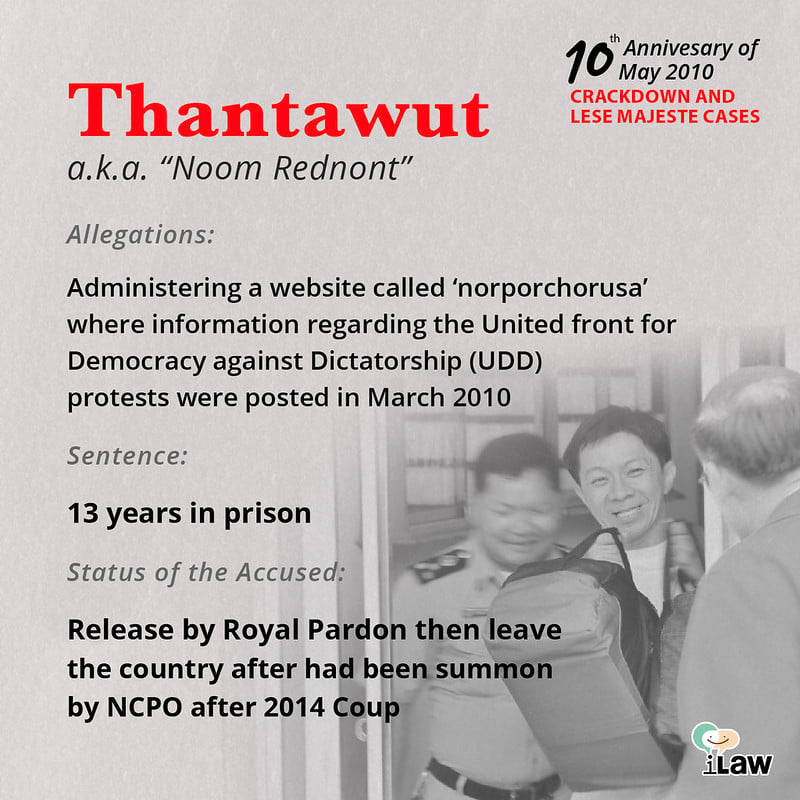
Thantawut or “Noom Rednont” lived with his then-10-year-old son in a rental apartment in Nonthaburi and owned a website development company. Aware that there were many Red-shirt groups in Nonthaburi, Thanawut tried to form a community by creating a website called “rednont.com”.
Thantawut was arrested on 1 April 2010 shortly after the Red-shirt protest began. He was accused of owning and administering the norporchorusa website and was accused on three charges:
- (13 March 2010) Of importing pictures and content onto the website using the alias ‘Admin.’
- (13 March 2010) Of importing pictures and content onto the website using the alias ‘Admin.’ Both messages were related to the Red-shirt protests as they both conveyed concerns over a possible political death.
- Of providing service through the Norporchorusa website, supporting or allowing others to import messages that offend the monarchy without deleting them.
Thantawut was refused bail. He rejected the charges and testified that he was only related to the website by having designed the logo as he was contracted by a person called “woodside” in his capacity as a website designer. He claimed that he had no relation to the content of the messages accused, did not post the accused messages, and had no power to investigate and delete the content on the website by himself.
On 15 March 2011, the court declared that the plaintiff’s evidence trustworthy and believed that the defendant was the website administrator. The defendant was found guilty according to section 112 of the criminal code and the Computer Crime Act; he was found guilty of importing to a computer system any information that offends the monarchy according to section 14(3) on two acts, landing him five years of prison each, and he was found guilty of intentionally supporting or allowing others to import information that offend the monarchy according to section 15 on one act, landing him another three years in prison. In total, he was sentenced to 13 years of prison.
Thantawut filed for appeal but later withdrew the request and requested the royal pardon. His petition was approved and he was released on 5 July 2013, after three years, three months, and five days of imprisonment. However, after living normal life for almost a year, he was called to report himself after the 2014 coup without explanations, causing him to flee the country and seek political asylum.
For further details: https://freedom.ilaw.or.th/en/case/19 |
Somyot: Editor of the ‘Voice of Thaksin’
Allegations: Distributing an article titled ‘Komkwamkid’ in the Voice of Thaksin magazine: February-March 2010 issue
Sentence: 6 years in prison
Status of the Accused: Released after having fully served the sentence
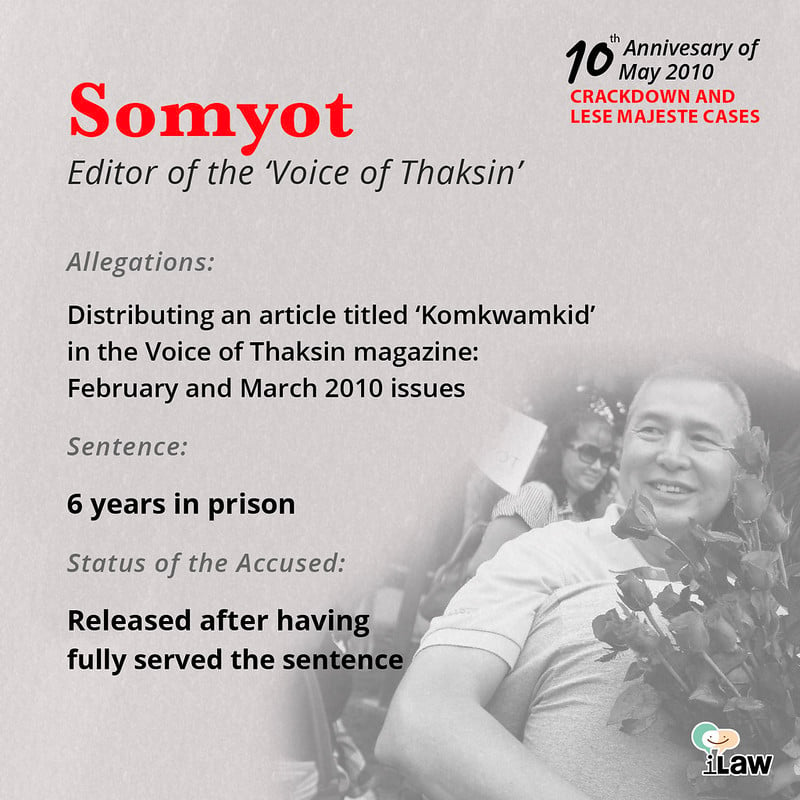
Somyot Prueksakasemsuk was the chair of the Union of Labor Alliance for Democracy. He led multiple workers’ anti-government protests in 2007. Somyot began his position as the ‘Voice of Thaksin’ magazine editor and leader of the “June 24 for Democracy” group a few days before his arrest. He was advocating for the repeal of section 112 of the criminal code. During the ‘Red-shirts’ protests in May-June 2010 when media outlets were censored, Somyot was held in custody for 19 days under the power of the Emergency Decree. After release, Somyot changed the magazine name from “Voice of Taksin” to “Red Power.” He was also one of the individuals identified on the “Anti-Monarchy Chart” according to the Centre for Resolution of Emergency Situation which was publicized in 2010.
Somyot was arrested on 30 April 2010 and remained in custody since. Although he filed for bail at least 16 times with highest bail security of 4,762,000 THB, all of them were refused. Somyot’s main charges on Article 112 were linked to his publication of an article titled ‘Komkwamkid,’ written under the pen name “Jit Polachan.” The article mentioned political incidents using a character called ‘Royal Narueban’. The Department of Special Investigation (DSI) filed a case against Somyot – the editor – as he was believed to have acknowledged and consented to distributing content that offended the king.
During the trial, the plaintiff asked for the witness investigations to take place in four provincial courts – Sakeaw, Phetchabun, Nakonsawan, and Songkhla even though some of the witnesses reside in Bangkok. Somyot was ferried to and fro in the prisoner transport vehicle, causing him discomfort. He was put under short-term custody in provincial cells, hindering his relatives from visiting. In the court of first instance, Somyot testified that the article’s content was not directed against the king but rather groups of elites. Moreover, he was the editor, not the publisher, of such content which indicated that he was not responsible for the content according to the Printing Recordation Act.
On 23 January 2013, the court of first instance found Somyot guilty according to section 112 of the criminal code for two of the published articles and handed Somyot ten years in prison. The court specified that although the article did not specifically mention the king and used alias, readers could still interpret it as the king using the historical context within the article. The court of appeals affirmed the verdict, and the Supreme Court reduced the sentence to six years imprisonment.
Somyot was one of the few defendants facing the section 112 charges who appealed to the Supreme Court without accepting charges or applying for the royal pardon. He also had to accept another year of imprisonment (7 years in total) on the Saprang Kalayanamitr libel case and was released on 30 April 2019 after having served all seven years.
For further details: https://freedom.ilaw.or.th/en/case/61 |
Jeng Dokjig
Allegation: Giving speeches at the UDD protest near Panfaleela Bridge on 29 March 2010
Sentence: 2 years in prison
Status of the Accused: Released after having fully served the sentence
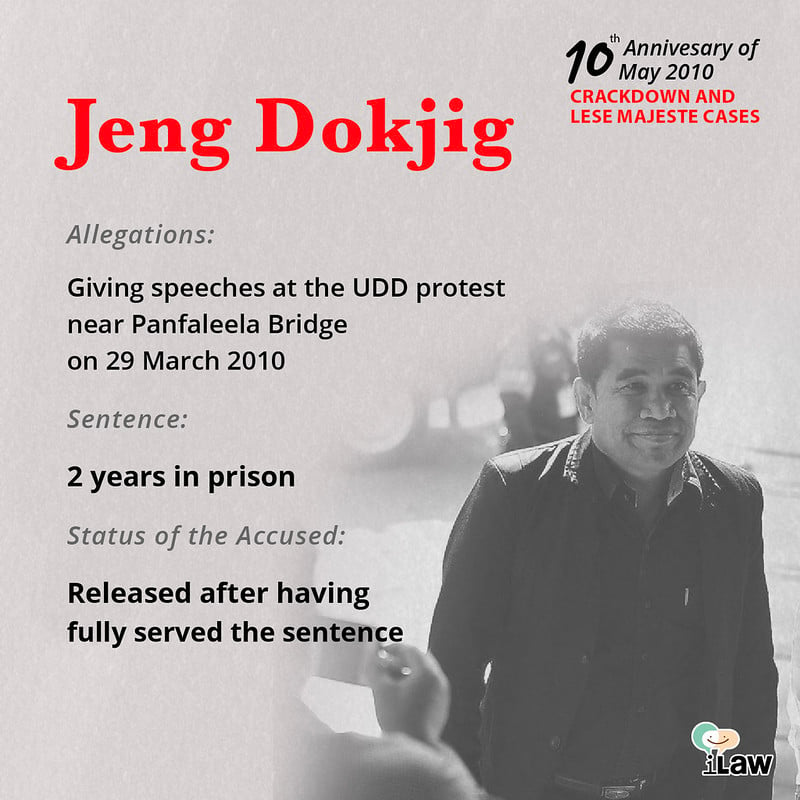
Yoswaris , also known as Jeng Dorkjig, was a former comedian who became an important participant in the UDD movement. He was charged after giving a speech at the UDD protest near Panfaleela Bridge on 29 March 2010 during which he paused and showed a hand sign that could be deemed offensive to the monarchy.
Yoswaris initially accept charges then later denied and asked for trial. The investigation took place from October to December 2012. In January 2013, the court of first instance found him guilty and handed him three years in prison. Since the defendant’s testimony was beneficial to the case, the court reduced the sentenced by one-third to two years imprisonment without suspension. Yoswaris appealed and was allowed a 500,000 THB bail.
The court of appeals affirmed the court of first instance’s verdict on 1 May 2014 and the Supreme Court on 7 March 2017, confirming the sentence of 2 years in prison. According to the court, even though the defendant did not directly mention his majesty the king, his words and gestures could be interpreted by several plaintiffs as relating to the king. On the defendant’s request for a lighter sentence or suspension, the Supreme Court was convinced that the court of first instance and the court of appeals had already given the lowest permissible sentence and had reduced the sentence by one-third.
On 6 February 2018, Yoswaris was released after having fully served the sentence.
For further details: https://freedom.ilaw.or.th/en/case/43 |
Throwing the Royal Banner into a River
Allegation: Throwing the royal banner into Ping River, Chiang Mai, on 19 May 2010
Sentence: Criminal proceedings withheld temporarily
Status of the Accused: Unknown
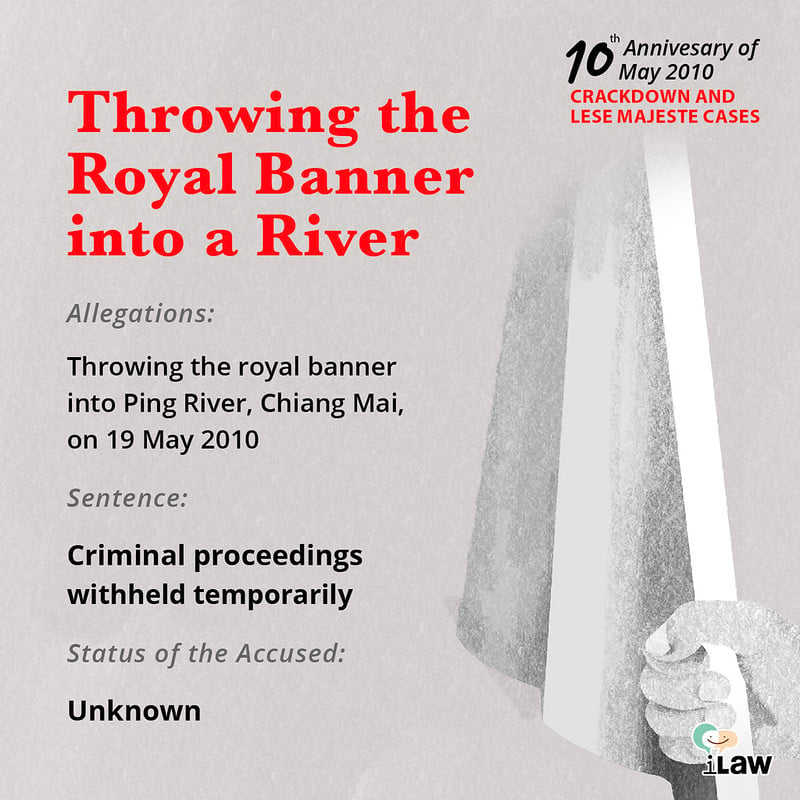
Kritsada was a food-seller in Chiang Mai who participated in a UDD protest near the Nawarat Bridge in Chiang Mai. Upset by the military crackdown on UDD protesters in Bangkok on 19 May 2010, a riot broke out as people were angered by the state-sponsored violence in Bangkok; tires and fire trucks were burned. Kritsada threw nearby objects, including the yellow royal banner, into the Ping River.
His actions were caught on camera and published online. His full name was revealed to the public, drawing threats to him and his family. An arrest warrant was initially issued on the ground of destroying public property. In December 2010, Kritsada handed himself over but discovered that the official document added an additional charge according to section 112 of the criminal code. Kritsada deposited a title deed worth 8.5 million THB as bail security and was released during investigation. In 2011-2012, the public prosecutor postponed the prosecution while he was still on bail.
On 22 May 2014, the day of the coup, the public prosecutor submitted a prosecution order at the Chiang Mai Provincial Court. During the course of trial, the defendant asked for a postponement, citing the defendant’s hemorrhagic stroke which caused impairment in speech and communication, thus not fit for trial. A physician testified that the defendant suffered hemiplegia as a result of brain damage on the left side, hence the defendant could neither communicate by text nor speech; listening and comprehension were also impaired, and the defendant could not exercise critical thinking, make estimates, calculate, or make simple decisions at all.
On 1 October 2014, the court found the defendant unfit for trial, thus ordered a temporary suspension to the criminal proceedings according to section 14 of the criminal code and ordered the defendant to be sent to Suanprung Hospital for medical examinations.
For further details: https://freedom.ilaw.or.th/en/case/353 |
Surachai Sae-dan
Allegations: Gaving multiple speeches at the “Red-shirts” protest between 2008-2010
Sentence: 12 years and 6 months of imprisonment in total from 5 criminal cases
Status of the Accused: Release by Royal Pardon then leave the country after had been summon by NCPO after 2014 Coup. In December 2018 Surachai was reportly was kipnaped along with other two assistants. His faith was unknown but presume death.
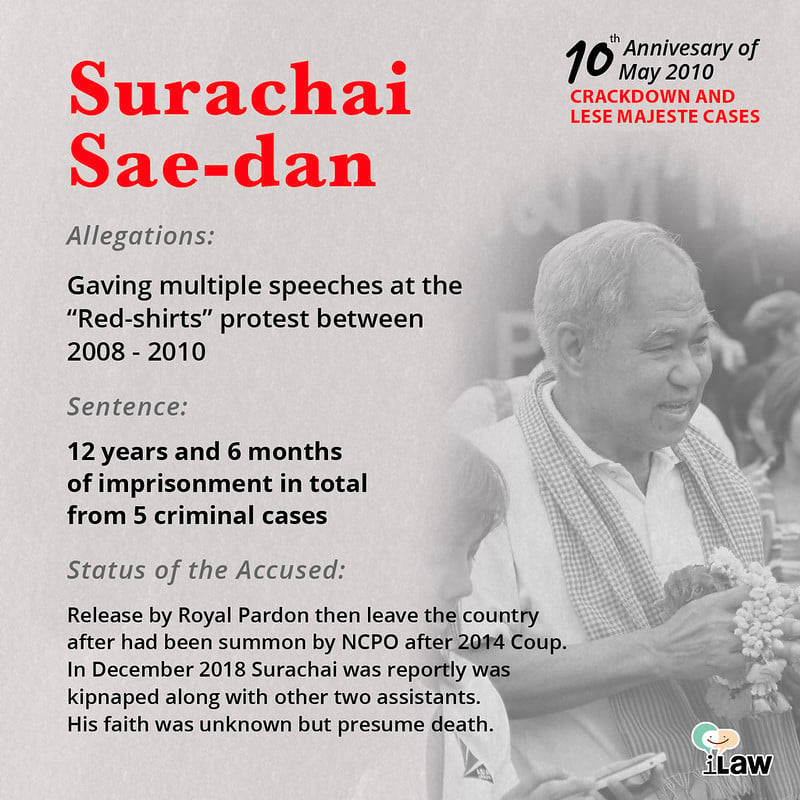
Surachai Sae-dan, or Surachai Danwattananusorn, was a political activist who previously joined the Communist in 1973 before entering political arena under the New Aspiration Party and the Thai Rak Thai Party respectively in 2011. Surachai had been actively advocating against the coup since 2006 and later joined UDD. Once he was removed from the UDD, he continued propagating his ideology under the “Red Siam” political movement by organizing and being outspoken. Surachai was accused of royal defamation in five different cases from his speeches at the Red-shit protest as follows:
- 15 December 2008’s speech at UDD Sanamluang Stage
https://freedom.ilaw.or.th/en/case/49 - 11 September 2010’s speech at Doi-Saket Stadium, Chiang Mai
https://freedom.ilaw.or.th/en/case/47 - 29 October 2010’s speech at Sri Bunrueng temple – Dong Makrud village
Nhong Hai, Udon Thani https://freedom.ilaw.or.th/en/case/48 - 18 December 2010 in the 2 Ta Sawang Seminar by 4s at Samakkeetham Temple
https://freedom.ilaw.or.th/en/case/46 - 5-6 February 2011’s speech on Samakkeetham Temple-stage
https://freedom.ilaw.or.th/en/case/50
The content of the speeches could not be published here. However, the overall political conflict took place over multiple years; the Red-shirt protests in 2010 led to scores of death. Surachai was arrested on 22 February 2011 after giving a speech near Sanam Luang and remained in custody of the Bangkok Remand Prison since. During trial, Surachai admitted guilt on all charges. The court sentenced Surachai, according to section 112, two years and six months of imprisonment for each case, totaling 12 years and six months in prison for royal defamation. He was granted the royal pardon on 4 October 2013.
After the 2014 coup by the National Council for Peace and Order (NCPO), Surachai and hundreds of other political activists sought asylum abroad while remaining politically active. On 12 December 2018 – a day before the NCPO visited Lao People’s Democratic Republic Surachai, Comrade Poochana, and Comrade Kasalong were reported missing. On 27 December 2018, the first body was found on the river bank adjacent to the Thai-Laos market in Tha Phanom district, Nakhon Phanom Province; the second body was found on 28 December 2018 in Tha Jumpa sub-district, Tha U-then district, Nakhon Phanom Province; and the last body was found on 29 December 2018 in Ajsamart sub-district, Nakhon Phanom Province. Forensics report using DNA examination proved 2 of the 3 bodies matched with two of Surachai’s close friends.
The question of how many bodies were found is still debated. According to police, while waiting to examint the second body, the body drifted along the river, causing the police to believe that the body found in Tha Jumpa sub-district Tha U-then, Nakhon Phanom and the body found in Ajsamart sub-district, Nakhon Phanom were the same body. Pranee, Surachai’s wife, believes that there were three bodies, and that Surachai’s body was destroyed.

